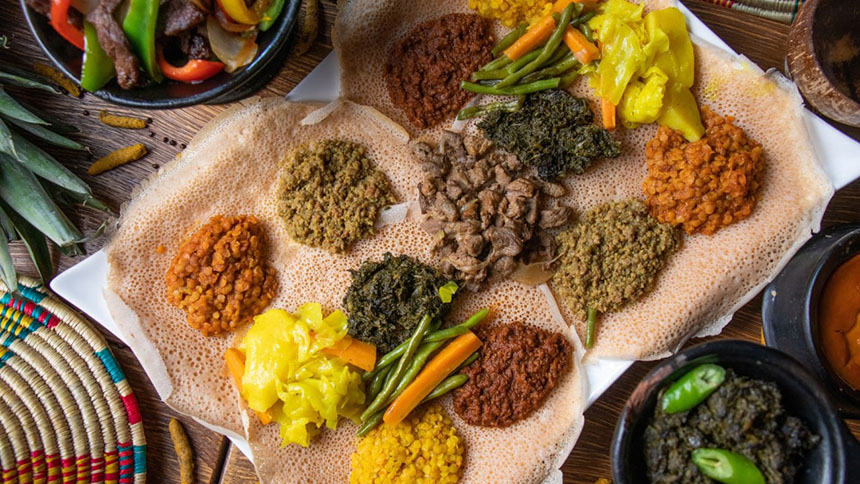Users
Social media
- More details here...
- Address
Parc Científic de la Universitat de València C/
Catedrático Agustín Escardino, 9
46980 Paterna (Valencia) Spain - Email:
iu.i2sysbio@uv.es - Phone:
(+34) 963544810
- Address
Links
Pioneering study on the microbial diversity of traditional fermented foods in Ethiopia

Investigation
Pioneering study on the microbial diversity of traditional fermented foods in Ethiopia
Scientists from I2SysBio and the biotechnology company Darwin Bioprospecting Excellence, in collaboration with entities from Ethiopia and Ecuador, have published a study on the microbial diversity of fermented foods and beverages in Ethiopia in the journal Frontiers in Microbiology.
A multidisciplinary team coordinated by the Institute for Integrative Systems Biology I2SysBio (a joint centre of the University of Valencia and the CSIC) and the University of Valencia spin-off Darwin Bioprospecting Excellence has conducted the first comprehensive study on the microbial diversity present in traditional fermented foods and beverages in Ethiopia. The work was carried out in collaboration with Wolaita Sodo University (Ethiopia) and the Ecuadorian company Quiitos S.A.S.
The study reveals the importance of traditional knowledge about fermentation and links it to the most advanced tools of modern microbiology, with the aim of identifying beneficial bacteria that can be exploited in fields such as functional foods, biotechnology and human health.
Rediscovering the microbial biodiversity of ancestral foods
Ethiopia has an enormous wealth of traditionally produced fermented products, which form a fundamental part of its diet and cultural heritage. However, their microbial basis is largely unknown.
In this context, the scientific team designed a comprehensive study combining genetic sequencing (metataxonomy), strain isolation and cultivation (culturomics) and physicochemical analysis to describe in detail the microbial communities present in nine traditional foods: two solid products (kotcho and injera), a condiment (datta) and six fermented beverages (tej, tella, cheka, kinito, borde and shamita).
The results show great microbiological heterogeneity between products, reflecting both the variety of ingredients and processes and the ecosystemic richness of spontaneous fermentations. Almost all the foods analysed were dominated by bacteria of the phylum Firmicutes, especially lactic acid bacteria widely known for their ability to improve digestibility, preserve food and generate compounds with probiotic effects.
Differentiated microbial profiles and strains with functional potential
Each product showed a specific bacterial profile. In injera, for example, Lactobacillus predominated, accounting for over 60% of the total bacteria identified, while in beverages such as tej, the microbial ecosystem was dominated by Zymomonas mobilis, a sugar-fermenting bacterium that also produces ethanol and prebiotic compounds. On the other hand, a large presence of Levilactobacillus spicheri and L. zymae was detected in borde, species that can synthesise GABA (γ-aminobutyric acid), a neuroactive metabolite.
‘Tej particularly surprised us due to the almost complete dominance of Zymomonas mobilis, which shows that some of these traditional products can be a natural source of strains with unique technological properties,’ said Carmen Sanz, director of the Health & Nutrition Department, researcher at Darwin Bioprospecting Excellence and one of the authors of the article.
Datta, a spicy condiment with a paste-like texture, showed the greatest diversity of species, including some with potential applications in plant fermentation or the development of new starters.
In addition to genomic analyses, the team managed to isolate 79 strains from laboratory cultures, many of which are of interest to the food industry. These strains represent a valuable microbial collection that could be used in future developments such as controlled fermentations or customised probiotic formulations.
Food security and modernisation of traditional practices
Along with microbiological analysis, physicochemical measurements were performed to evaluate characteristics such as pH, sugar content and ethanol levels. Tej was the product with the highest alcohol and sugar content, which could contribute to both its organoleptic profile and the stability of its microbiota. In contrast, beverages such as cheka and shamita had very low levels of residual sugars, reflecting a more complete fermentation.
The study also highlights the need to strengthen hygiene practices in the production of these products. In some samples, such as tej, microorganisms indicative of environmental or faecal contamination were detected. ‘It is not a question of eliminating or industrialising these traditional practices, but of understanding them thoroughly so that they can be improved without losing their essence or cultural value,’ stresses Manuel Porcar, researcher in the Biotechnology and Synthetic Biology group at I2SysBio and co-author of the article.
An international collaboration from Valencia
The project demonstrates how collaboration between academic teams and technology-based companies can generate original knowledge with a global impact. For Darwin Bioprospecting Excellence, the research reinforces its position as a leader in the study of applied microbiomes, and for I2SysBio, it consolidates its line of research in microbial ecology and fermentation biotechnology.
This work opens up new opportunities to explore the functional biodiversity of traditional foods and lay the foundations for safer, healthier and more sustainable fermented products. It also highlights the importance of preserving local knowledge and integrating it into global food innovation agendas.
Reference:
Sanz-López C, Amato M, Torrent D, Borrego M, Anza M, Bibiso M, Grijalva-Vallejos N, Vilanova C, Porcar M and Pascual J (2025) Microbial ecology of selected traditional Ethiopian fermented products. Front. Microbiol. 16:1570914. DOI: 10.3389/fmicb.2025.1570914
Source: University of Valencia Science Park


